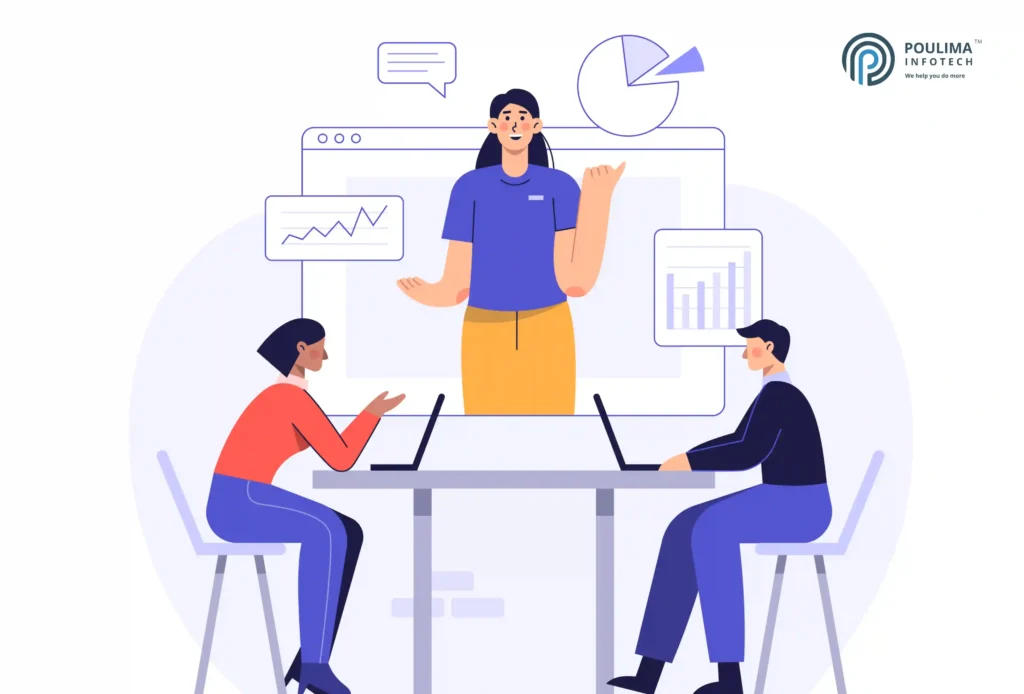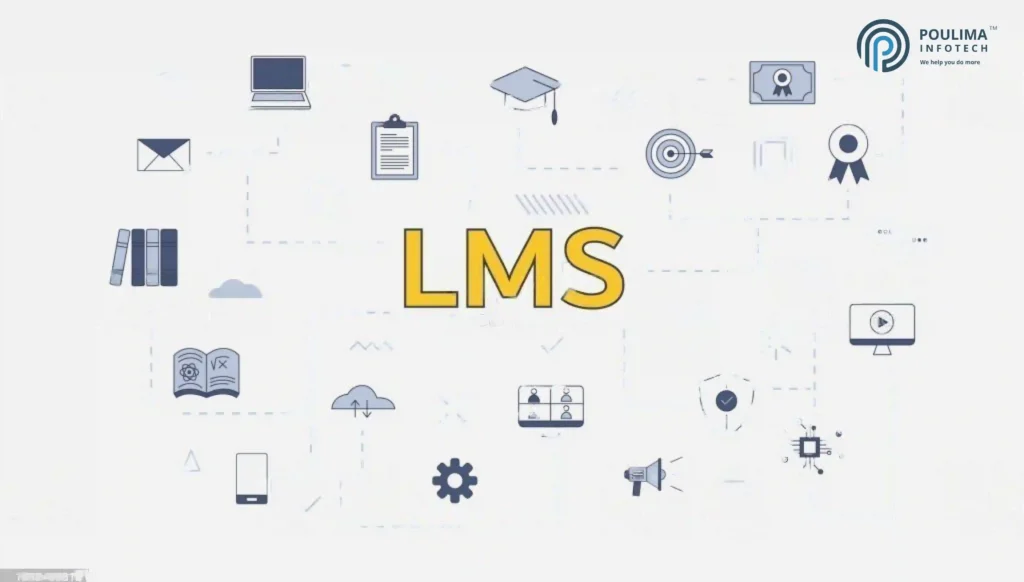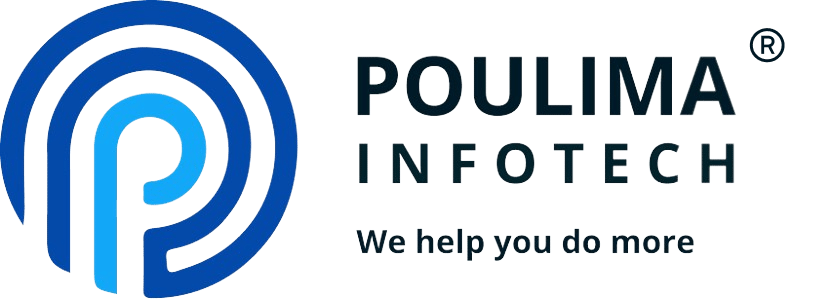A corporate learning management system (LMS) facilitates corporations to organize, track and manage efforts to instruct or train the workers, customers, and alternative external partners.
The product of the Corporate learning management system manages personalized training programs for onboarding, development, and compliance coaching functions.

Organizations use a Corporate learning management system to assign courses to workers or external finish users, then track learners’ progress as they complete course lessons and assessments.
Corporate learning packages include apps that help organizations train, develop and engage their learners. These packages continue to extend the functionality and strength of their components.
The package supports organizations with compliance, certifications, integration, talent development, collaboration, coaching and mentoring, business training, partner education, and customer training.
Benefits of Corporate Learning Management System

1. Training content is available in a single location.
Corporate learning management system stores and manages all training materials in a single location, i.e. a cloud server. This minimizes the risk of data loss.
It allows for the development of its own training materials in accordance with current needs. The cloud LMS is stored on a remote server; so, any authorized member can access the requested information at any time, anywhere.
2. Liberty for unrestricted access.
Once you upload and post the training content to Corporate LMS, employees have unlimited access to any part of the information, no matter where they are located.
Even the latest information provided can be accessed via the smartphone and tablet to integrate learning into the current task; Therefore, employees do not need to wait until the next training session to keep up to date on the latest developments.
3. You can measure the performance of the learner
Advanced LMS supports tracking the learner’s progress; measures ensure that learners are performing best.
If a learner does not seem to be progressing as expected, they can use additional resources to improve their learning and thereby improve their performance.
Advanced LMS functions, such as AI-based analysis and reporting tools, allow training instructors to identify areas for improvement and areas where the learner excels.
If the majority of learners appear to have difficulty with a particular subject, the content can be reassessed to make the necessary changes.
4. Reduces training and development costs.
Cost plays an important part in decision-making in corporate LMS.
The corporate learning management system eliminates travel expenses for instructors, training space rents, cost of printed materials, etc.
Learners are able to transport all training materials everywhere.
Cost reduction has been a powerful driver of the increasing popularity of the Corporate Learning management system.
5. Learning time can be reduced
The Corporate learning management system reduces the time it takes to learn a particular competency.
Users can access a specific portion of the information or knowledge they need because the training content is uploaded into easy-to-explore categories with titles and subtitles.
Rather than taking a full training program, learners can click on the specific module where they obtain the relevant information or knowledge.
They can also assess their level of knowledge by taking part in online examinations, questionnaires, interactive sessions, etc.
6. Assists organizations in modifying processes in accordance with recent compliance regulations.
Compliance laws are always evolving; therefore, organizations must make changes to existing practices.
The corporate learning management system is a valuable tool for updating training content in accordance with the amended regulations.
The corporate learning management system simplifies the task to educate learners on the latest compliance rules to avoid potential penalties.
7. Corporate LMS transcends the limits of online learning
The use of a Corporate learning management system is beneficial for educators and learners as it goes beyond the traditional boundaries of learning. The course and content may be expanded to include new trends, new technologies, management practices, problem-solving methods, evidence-based case studies, research studies, etc. Content creators do not have to change all the content or the e-learning module, but changes can be made at some point. Updated information may also be transmitted to relevant employees.
8 Key Characteristics of Corporate Learning Management System

The success of the Corporate Learning Management System in enterprise training depends on its usability, user-friendliness, and technical excellence. Below is a list of eight key characteristics a Corporate LMS must have in order to deliver training in accordance with collective expectations.
- Assessment of online progress.
- Compliance management
- Single Sign-on enables employees to use the same authentication as for other LMS.
- Branding – for corporate culture, reinforcement.
- User Feedback
- Course development
- Multimedia compatibility
- Personalization
1. Assessment of online progress
Assessment or Evaluation and management methodologies should be an integral part of the learning experience.
It allows learners to assess their progress, identify areas for review, and restore immediate learning/lesson objectives.
The assessment should take into account the learner’s particular needs, characteristics, and situations.
A corporate learning management system should be able to monitor the trainee’s progress and provide progress reports and management files for a more in-depth assessment.
It helps management monitor all trainee progress on a single platform and helps them identify the best talent.
Depending on the variety of feedback received by management, management may intervene to provide assistance or detailed feedback to a particular trainee.
2. Compliance management
Compliance management is the continuous process of monitoring and evaluating systems to ensure that they meet industry and safety standards, as well as corporate and regulatory policies and requirements.
This involves an evaluation of the infrastructure to identify non-compliant systems due to regulatory changes, policies or standards, configuration errors, or any other reason.
Managing compliance is important because non-compliance can lead to fines, security breaches, loss of certification, or other damage to your business.
Keeping up-to-date with compliance changes and updates avoids disrupting your business processes and saving money.
To successfully control and manage the compliance of your organization’s infrastructure, you will need to:
- Assessment: Identification of non-compliant, vulnerable, or unsuitable systems.
- Organize: Prioritize remedial measures by effort, impact, and severity of problems.
- Remediate: Quick and easy patch and reconfigure systems that need action.
- Report: Confirm that the changes have been applied and declare the results of the changes.
3. Single Sign-on enables employees to use the same authentication as for other LMS
Single login allows an employee to access a variety of corporate applications, such as an LMS with a single username and password, instead of having to use several identifiers to access these same systems.
It eliminates password recall and provides a convenient and seamless process for employees to navigate across multiple apps and access their LMS platform.
Single sign-on is available through various technologies, including SAML, ADFS, open APIs, and custom connectors and there are many ways SSO can work with the technology you use to connect your applications together.
A company login portal can be configured through a variety of identity and access management platforms.
A single username and password are required to log into the portal where you are able to access your many different corporate apps such as your LMS.
Simply locate and click on your LMS application in the portal, and you are immediately allowed to enter.
Benefits of using SSO in Corporate Learning Management System
- Enhances employee productivity
- Increases the take-up of learning.
- Reduces IT assistance service costs.
4. Branding – for corporate culture, reinforcement
If you are simply targeting a “better” culture within your organization, you are setting the bar too low.
An organization that adheres to values such as integrity and teamwork is not unlike others.
If you want to produce the specific types of results that will differentiate your business, You must define a single culture that cultivates the necessary types of employee attitudes and behaviors.
Building this one-of-a-kind culture transcends internal aspirations.
The companies that do it well also identify a brand identity, which I define as how you want your organization to be perceived and experienced by customers and other external stakeholders.
If your corporate culture is aligned and incorporated into that identity, your employees are more likely to make decisions and take actions that deliver on your brand promise.
It takes work to build that connection between culture and brand. You can begin by looking at different kinds of brand identities and where your business fits in. Brand types are classes of brands that share the same strategic approach or adopt similar positions to shape their competitive positioning.
There are nine types of company brands. They are Disruptive, Conscious, Service, Innovative, Value, Performance, Luxury, Style, and Experience.
Some of these types of brands overlap, and some features are, or should be, accepted by all brands. All brands are expected to provide good service.
But a brand that fits into the service brand type prioritizes the delivery of high-quality customer service and service above all else.
And their strategies, operations, and ultimately customer value propositions all focus on differentiation through excellent service.
Here are the key organizational values by brand type:
- Disruptive Brand: Compete, stand out and take chances.
- Conscious Brand: Determination, strong engagement, and transparency.
- Service Brand: Benevolence, humbleness, and compassion.
- Innovative Brand: Inventive, experimental and continuously improving.
- Value Brand: Affordability, fairness, and practicality.
- Performance Brand: Delivery, excellence, and coherence.
- Luxury Brand: Sophistication, distinctiveness, and status.
- Style Brand: Design, insight, and creativity.
- Experience Branding: Entertaining, enjoyable and original.
5. User Feedback
For a corporate learning management system to work effectively, it is very important that participants and users provide input.
A corporate LMS allows candidates and users to comment on training programs.
This helps organizations continually improve their training programs to provide more efficient and improved lessons for the benefit of their employees and trainees.
Providing feedback to learners increases engagement.
Feedback may be provided to learners after being manually corrected by an instructor or in real-time while conducting an assessment, displaying the results of an automatic screen correction in the learning management system.
This on-screen feedback may merely indicate whether the learner’s response was correct or incorrect.
It may also support the formative evaluation by providing the reason why the response was correct and, in the case of an incorrect response, by explaining the reasoning for the correct response.
Feedback can also be provided less formally in real-time by the learner’s instructors and peers through discussion groups related to the course.
This can be formally or unofficially incorporated into the course, but it will offer another opportunity for the learner to engage with the association community, and to learn from each other’s experiences and perspectives, enriching the global learning experience.
6. Course development
There is no doubt that modern technology has revolutionized our way of creating and delivering educational content.
An increasing number of students and staff are turning to online training and development to expand their knowledge base and expertise.
You need a corporate learning management system that enables the development of courses in the product.
Instructors and course developers have a wide variety of tools available to create engaging content.
And providing the necessary information and messages adds significant value, resulting in cost savings by reducing the need to purchase additional course development tools.
7. Multimedia compatibility
A corporate learning management system will be able to process and demonstrate media files and training materials to trainees.
Today’s corporate training platforms must provide great flexibility in terms of the content they can offer.
Files like photos, PPT presentations, audio, videos, etc. Everyone should be able to work on a corporate learning management system.
Systems should be able to link to external sources and incorporate these links easily, enabling easy user access.
This function allows management to download various types of learning materials, such as audio files, documents, videos, etc. for the benefit of the trainees.
8. Personalization
Not all users are similar and do not have the same training needs, learning styles, or technology skills.
Your corporate training system should be able to customize its use with easy-to-follow instructions.
And easily traceable advances in specific courses or larger multi-session modules.
Final Thoughts:
The average employee spends only 3% of their time on skills development, meaning that it takes them more than 10 years to learn what they need to know to be successful in their current role.

As a top custom software development company, Poulima™ Infotech can develop a corporate learning management system, that helps employees find the right content for their skill needs and offers one-on-one coaching. Employees can learn at the speed of life – and grow faster and be more successful.

